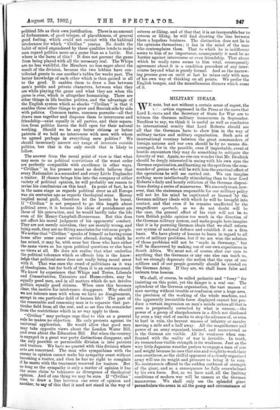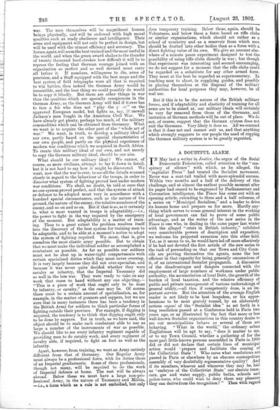MILITARY IDEALS.
WE note, but not without a certain sense of regret, the sa! action expressed in the Press at the news that Lord Roberts and the Secretary of State for War are to witness the German military manceuvres in September. Needless to say, we think it is useful as well as conducive to international comity that Lord Roberts should see all that the Germans have to show him in the way of military tactics and military organisation. Such acts of international courtesy between the great commanders of foreign nations and our own should be by no means dis- couraged, for in the possible, even if improbable, event of hostile encounters they may do something to mitigate the ferocity of war. Again, no one can wonder that Mr. Brodrick should be deeply interested in seeing with his own eyes the German organisation, and learning on the spot from the com- mander of genius who will be with him the practical effect of the operations he will see carried out. We can imagine nothing more intellectually stimulating than to hear Lord Roberts's daily and hourly criticism of the German disposi- tions during a series of manceuvres. We sincerely trust, how- ever, that the statesman responsible for our military policy will not let his mind be captivated or biassed by the German military ideals with which he will be brought into contact, and that even if he remains unaffected by the magnificent spectacle, as we do not doubt will be the case, the general effect of his visit will not be to turn British public opinion too much in the direction of the German military system, and make people here imagine that it is by pursuing German ideals that we shall reform our system of national defence and establish it on a firm basis. We have plenty of lessons to learn in regard to all sorts of military problems, but if we are wise the solution of those problems will not be " made in Germany," but will be discovered by making use of our own experiences in South Africa. We must not, of course, shut our eyes to anything that the Germans or any one else can teach us, but we strongly deprecate the notion that the eyes of our soldiers and of our people generally should be riveted on the German Army. If they are, we shall learn false and unlearn true lessons.
We shall, of course, be called pedantic and " fussy " for insisting on this point, yet the danger is a real one. The splendour of the German organisation, the vast masses of men moving without trouble or confusion over a huge area, the precision of the working of the whole machine, and the apparently irresistible force displayed cannot but pro- duce a certain impression on men's minds unless all that is seen is perpetually corrected by what is unseen,—the power of a group of sharpshooters in a ditch not disclosed by even a tiny curl of smoke to stop the advance of, or even to hurl in ruin, the bravest masses of infantry or cavalry moving a mile and a half away. All the magnificence and power of an army organised, trained, and manoeuvred as is the German are visible. All its weakness when con- fronted with the reality of war is invisible. In truth, its tremendous visible strength is its weakness. Just as the wiry little Japanese wrestler prefers to engage a man of size and weight because he uses that size and weight to work their own overthrow, so the skilful opponent of a closely organised army will use its weight and pressure to bring it to ruin. No resistance is offered to the sudden outburst of strength of the giant, and as a consequence he falls overwhelmed by his own force. But, as we have said, all the limiting conditions of modern war will be unseen at the German manceuvres. We shall only see the splendid giant perambulate the arena in all the pomp and circumstance of war. The men themselves will be magnificent human beings physically, and will be endowed with high moral qualities such as ready obedience and intelligence. Their arms and equipment will not only be perfect in design, but will be used with the utmost efficiency and accuracy. The horses, again,will seem the best trained and the most useful in the world, and when the green sward shakes to the thunder of twenty thousand hoof-strokes how difficult it will be to repress the feeling that German courage joined with an organisation so perfect and so well devised must carry all before it. If numbers, willingness to die, arms of precision, and a Staff equipped with the best maps and the best system of field telegraphs were all that is required to win battles, then indeed the German Army would be irresistible, and the best thing we could possibly do would be to copy it blindly. But there are other things in war than the qualities which are specially conspicuous in the German Army, as the German Army will find if it ever has to face a foe who does not " play the g. ne" on the approved European model, but fights as, say, St3newall Jackson's men fought in the American Civil War. We have already got plenty, perhaps too much, of the military commodities which can be obtained from Germany. What we want is to acquire the other part of the " whole art of war." We want, in truth, to develop a military ideal of our own, partly based on the special characteristics of our own people, and partly on the physical experience of modern war conditions which we acquired in South Africa. To create this military ideal of our own, and not merely to copy the German military ideal, should be our aim.
What should be our military ideal ? We cannot, of course, as mere civilians, attempt to lay it down in detail, but it is not hard to say how it might be discovered. We want, now that the war is over, to see all the details scanned closely in regard to the behaviour of the troops, in order to discover what system of fighting proved best under modern war conditions. We shall, no doubt, be told at once that no one system proved perfect, and that the system of attack or defence to be adopted must vary in accordance with a hundred special circumstances, such as the nature of the ground, the nature of the enemy, the relative numbers of the enemy, and so on and so on. But if that is so, as it certainly is, what is most wanted in troops is adaptability,—i.e., the power to fight in the way required by the emergency of the moment. But adaptability is a matter of train- ing. Thus to a great extent the problem resolves itself into the discovery of the best system for training men to be adaptable, and to be able at a moment's notice to adopt the system of fighting required. We must, that is, give ourselves the most elastic army possible. But to obtain that we must make the individual soldier as accomplished a combatant as possible. As far as possible our soldiers must not be shut up in water-tight compartments with certain specialised duties which they must never overstep. It is very largely because they did not over-specialise, and because it was never quite decided whether they were cavalry or infantry, that the Imperial Yeomanry did so well in the late war. They were ready to take on any work that came to hand without any one objecting,— "This is a piece of work that ought only to be done by infantry, or cavalry," as the case may be. Of course there must be a certain amount of specialisation, as, for example, in the matter of gunners and sappers, but we are sure that in many instances there has been a tendency in the British Army for soldiers to think particular forms of fighting outside their province. For example, if digging is required, the tendency is to think that digging ought only to be done by sappers. Yet in truth, as we have said, the object should be to make each combatant able to use as large a number of the instruments of war as possible. We should like to see every infantry regiment capable of providing men to do cavalry work, and every regiment of cavalry able, if required, to fight on foot as well as the infantry.
Apart, however, from training, we want an Army entirely different from that of Germany. Our Regular Army must always be a professional force, with its duties those of an Imperial gendarmerie. Some of these professionals, though not many, will be required to do the work of Imperial defence at home. The rest will be always abroad. Below these we must have a large non-pro- fessional Army, in the nature of Yeomanry and Militia, —i.e., a force which as a rule is not embodied, but only does temporary training. Below these, again, should be Volunteers, and below these a force based on rifle clubs or similar organisations, which should act rather as a school of musketry and as a reservoir from which men should be drafted into other bodies than as a force with a, direct fighting value of its own. We give an account else- where of a minute peace experiment designed to test the possibility of using rifle clubs directly in war ; but though that experiment was interesting and seemed encouraging, we do not suggest for a moment that the rifle clubs could be regarded as a substitute for any other armed force. They must at the best be regarded as supernumerary. In teaching men to shoot, in supplying guides, and possibly in placing themselves at the disposal of the military authorities for local purposes they may, however, be of real use.
But if this is to be the nature of the British military forces, and if adaptability and elasticity of training for all arms are to be aimed at, our military ideals will certainly be very far removed from those of the • Germans, and imitation of German methods will be out of place. We do not, of course, suggest that the German system does not suit the Germans. Very likely it does so. All we contend is that it does not and cannot suit us, and that anything which strongly suggests to our people the need of copying the German military system is to be greatly regretted.







































 Previous page
Previous page